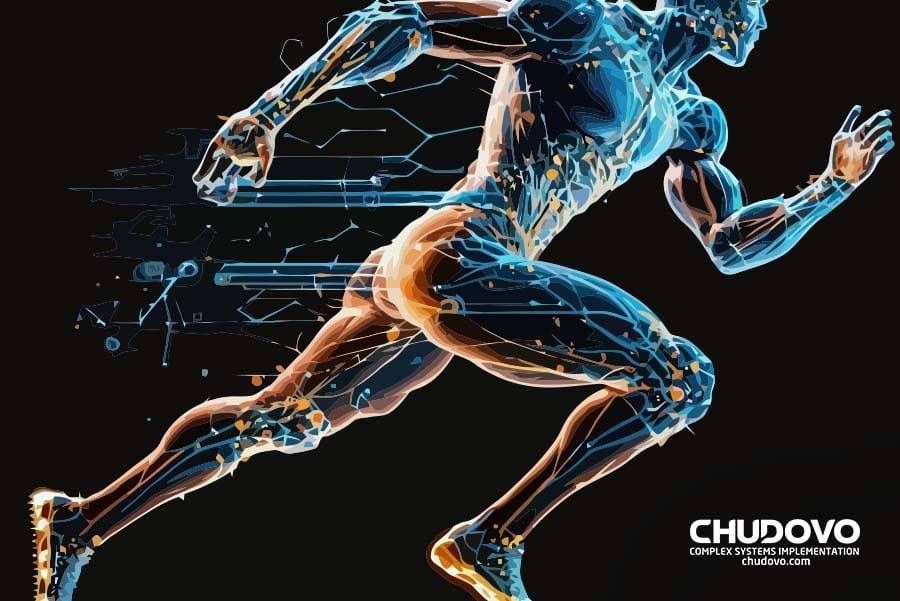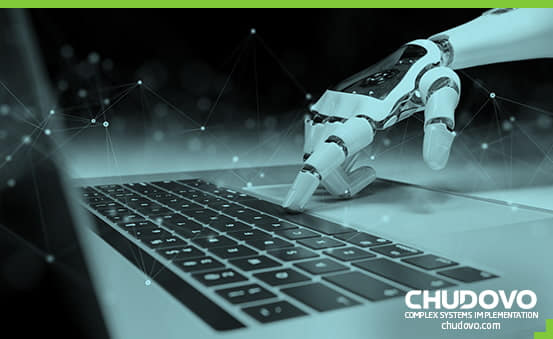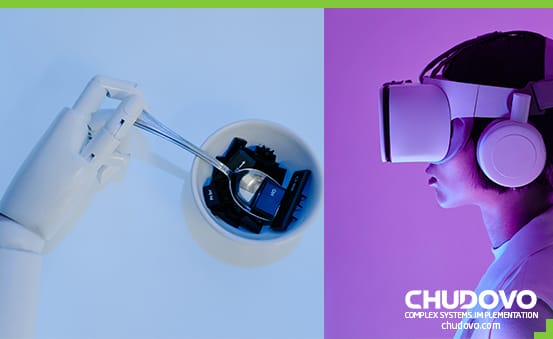Revolutionizing the Game: Artificial Intelligence in Sports Industry
The integration of artificial intelligence in the world of sports has brought about a significant transformation. With data playing a crucial role in the sports industry, the use of AI technologies has become more prevalent. Not only are startups developing specialized solutions, but major tech companies are also investing in sports analytics, leading to a game-changing union between AI and sports. How Artificial Intelligence is Revolutionizing the Sports Industry. Discover how AI technology is reshaping player performance analysis, enhancing fan engagement, and streamlining operations in the dynamic world of sports.
Table of content

Definition of Artificial Intelligence (AI)
Artificial Intelligence, often called AI, refers to the simulation of human intelligence processes by machines, especially computer systems. These processes include learning (acquiring information and rules for using the data), reasoning (using rules to reach approximate or definitive conclusions), and self-correction. Unlike traditional programming, where explicit instructions are given to perform a task, basic AI systems are designed to analyze data, recognize patterns, make decisions, and improve performance over time without direct human intervention. This is often achieved using algorithms and models derived from studying the human brain’s structure and function, such as neural networks.
Types of AI in Sports
Multiple technologies come into play at the intersection of AI and sports, each with the unique potential to redefine how we approach the game. Whether machine learning algorithms predict the next big star, computer vision tracks every minute movement on the pitch, or neural networks analyze vast datasets to improve development team strategy, AI offers an arsenal of tools tailored for athletic excellence.
Machine Learning
The world of sports has benefited tremendously from the integration of machine learning. Historically, game outcomes were forecasted based on past results, player statistics, and gut instincts. With the incorporation of machine learning, predictions are more nuanced, relying on the interplay of numerous factors.
- Game Outcomes
Machine learning models can be fed with data points such as team rankings, historical match outcomes, weather conditions, and crowd morale. Algorithms sift through this vast sea of information, discerning patterns that may escape the human eye, leading to more accurate predictions of which team might emerge victorious.
- Player Performance
By analyzing an individual player’s past performance, training statistics, and even social media activity, these algorithms can make predictions about how well a player is likely to perform in a future game. This has ramifications not just for game strategists but also for fantasy sports enthusiasts.
- Injury Predictions
The prospect of injury is a dark cloud that hangs over every sport. With machine learning, predicting the likelihood of a player getting injured is possible. By studying biomechanics, player fatigue, and historical injury data, models can flag players at increased risk, helping with preventive measures.
Computer Vision
A live game’s beauty lies in the final score and every pass, tackle, and shot. Computer vision captures these micro-events, turning them into actionable insights.
- Real-time Monitoring
High-speed cameras, combined with computer vision algorithms, can track every movement on the field. This provides invaluable data points like player positioning, ball trajectory, and player speeds.
- Game Analytics
Traditional statistics often need to learn the game’s nuances. With computer vision, coaches can get insights like heat maps of player movements, frequency of specific game patterns, and detailed breakdowns of every play.
- Officiating Assistance
Referees and officials can use computer vision as an aid. Goal-line technology, or the VAR system in football, is instrumental in making fair and accurate decisions.
Deep Learning
While machine learning provides a broader framework, deep understanding dives deep (pun intended) into the game’s intricacies.
- Enhanced Video Analytics
Deep learning models, especially convolutional neural networks (CNNs), have revolutionized video data analysis. By processing thousands of video frames, these models can detect subtle patterns and movements that can be missed in real-time viewing.
- Game Simulations
Ever wondered how your favorite team would fare against a legendary squad from the past? Deep learning can simulate such hypothetical matches by analyzing playing styles, team strategies, and individual player statistics. This provides exciting content for fans and offers coaches a way to test systems against many opponents.
- Player Style Analysis
Each player has a unique style. Whether it’s how a footballer dribbles or a basketball player shoots, deep learning can dissect these styles, offering insights into strengths, weaknesses, and potential areas for improvement.
Features of AI in Sports
The fusion of sports and Artificial Intelligence (AI) has ushered in a new era of athletic excellence and fan interaction. Combining advanced algorithms with a raw passion for sports, AI introduces various innovative features that enhance the game both on and off the field. Here’s a glimpse into the transformative facets of AI in the sports landscape:
Real-time Performance Tracking
The intersection of Artificial Intelligence (AI) and sports has enabled a new dimension in understanding players’ performance in real time. Gone are the days when a coach had to rely solely on observation or post-match analysis.
- Player Movement Analysis
Through the integration of AI and wearable sensors, it’s possible to map out the exact movement trajectory of a player. This helps understand the game’s positioning, spacing, and other strategic aspects. For instance, footballers’ positioning data can reveal if a team is maintaining its formation or if a player is out of position.
- Energy Level Monitoring
Wearables, integrated with AI, can track metrics like heart rate, body temperature, and lactate threshold. This provides insights into a player’s fatigue levels, helping coaches make timely decisions about substitutions or strategy shifts.
- Emotion Detection
Facial recognition software powered by AI can read micro-expressions of players during a game. This can give insights into their mental state and motivation levels, or even detect if they’re likely to behave aggressively or make errors due to emotional stress.
Video Analytics
The power of video analysis has been supercharged with the incorporation of AI tech.
- Frame-by-Frame Analysis
With deep learning, computer vision allows for a granular breakdown of every video frame. Every pass, shot, or defensive move is scrutinized, revealing information that might be missed in real-time viewing.
- Automated Highlight Creation
AI can analyze the game’s footage and automatically generate highlights or crucial moments. This benefits broadcaster and provides players and coaches quick access to critical events.
- Customized Feedback
Players can receive tailored feedback based on video analytics. For instance, tennis players can get insights into their serve techniques, footwork, or volleying style derived from video data.
Predictive Analytics
Anticipating the future has always been a prized ability in sports. AI takes this a notch higher.
- Match Outcome Projections
By feeding past match data, player performance stats, and other relevant metrics into machine learning models, teams can get probabilistic predictions about the game’s outcome.
- Opponent Strategy Analysis
AI can study footage of competing teams, to understand their preferred strategies, strengths, and weaknesses. This helps a team tailor their preparation, focusing on exploiting these identified vulnerabilities.
- In-game Adjustments
Predictive analytics isn’t just about pre-game preparations. Real-time data can feed into AI models during the game, suggesting potential strategy shifts. For instance, if a basketball team consistently fails to defend against three-point shots, the AI might offer defensive adjustments.

Pros of Incorporating AI in Sports
In the ever-evolving realm of sports, Artificial Intelligence (AI) has emerged as a game-changer, revolutionizing player training, game strategies, and fan experiences. The integration of AI promises optimized athletic performance and a redefined way for fans to engage with their favourite sports. Here’s a deeper look into the myriad advantages of weaving AI into the sports tapestry:
Enhanced Player Performance
- Tailored Training Regimes
Gone are the days of generic training routines. AI can now analyze an athlete’s biomechanics, performance stats, and physiological data to recommend training regimens that target specific areas of improvement. Whether it’s a sprinter needing to tweak their starting stance or a golfer refining their swing, AI offers precise insights.
- Dietary Recommendations
Nutritional intake is pivotal to an athlete’s performance and recovery. Using AI, nutritionists can factor in the athlete’s metabolic rate, workout regimen, and genetic predispositions to design a diet that perfectly aligns with their goals.
- Mental Health Strategies
The importance of mental well-being in sports is undeniable. AI tools can monitor athletes’ stress levels, sleep patterns, and cognitive loads to recommend interventions like meditation sessions, cognitive behavioral therapies, or rest periods.
Real-world Game Strategy Formulation
- Historical Data Analysis
AI can sift through volumes of past game data to uncover patterns – for instance, how a football team typically reacts under pressure or the offensive strategies a basketball team employs in the last quarter.
- Adaptive Strategy Suggestions
Real-time data can be fed into AI systems during a match, suggesting potential tactical shifts based on the ongoing game dynamics. This can be a game-changer, especially in closely contested matches.
- Opponent Weakness Detection
Instead of manually watching hours of game footage, AI can quickly pinpoint areas of vulnerability in opponent teams, allowing coaches to devise tactics that exploit these weak spots.
Fan Engagement and Experience
- Virtual Replays
Through AI, fans can relive thrilling moments from multiple angles in augmented or virtual reality settings. Imagine watching a soccer goal from the ball’s perspective or seeing a basketball dunk from above the hoop – all from the comfort of one’s home.
- AI-generated Commentary
AI can provide real-time stats, trivia, and insights, augmenting traditional commentary. For instance, while watching a cricket match, AI can instantly showcase data on a bowler’s past performance against a particular batter, enriching the viewing experience.
- Personalized Viewing
Fans can get content tailored to their preferences. If someone is a fan of a particular soccer player, AI can curate highlights or stats focused solely on that player.
- Interactive Engagement
Through AI-driven apps or platforms, fans can predict game outcomes, choose ‘player of the match,’ or even get suggestions on which games to watch based on their viewing history.
Examples of AI in Sports
The fusion of technology and sports has always been a precursor to dramatic shifts in how games are played, analyzed, and enjoyed. At the forefront of this revolution is Artificial Intelligence (AI). Today, AI is transforming sports in ways that were once the stuff of science fiction, optimizing athlete performance, reshaping game strategies, and enhancing viewer experiences. Whether it’s through analyzing vast amounts of data in seconds or creating personalized training programs, AI’s influence in the sports arena is undeniably profound. In this piece, we’ll delve into specific examples of how AI makes its mark on various sports, offering a glimpse into a future where human prowess and machine intelligence unite for extraordinary outcomes.
AI in Football: Real-time Game Analysis
Football, often dubbed “The Beautiful Game”, has seen a significant uplift with the infusion of Artificial Intelligence.
- Tactical Insights
Advanced AI algorithms process hours of game footage in real-time, revealing patterns, player movements, and weaknesses in both the team and their opponents. This allows coaches to make instant tactical decisions, such as switching formations or making key substitutions, based on AI recommendations.
- Player Performance Metrics
AI tools evaluate individual players’ actions, gauging aspects like ball possession, pass accuracy, and tackle efficiency. This can help identify standout performers or those who might be lagging during a particular match.
- Predictive Play Analysis
By analyzing past performances, AI can predict potential moves the opposition might employ, preparing the team for various scenarios they might encounter during the match.
AI in Healthcare: Player Health and Fitness Monitoring
Athlete welfare remains paramount, and AI has made strides in ensuring players are both fit and injury-free.
- Injury Prediction
By evaluating training data, player movement biomechanics, and historical injury records, AI can foresee potential injury risks. This aids in preventive measures, ensuring players don’t suffer from avoidable injuries.
- Rehabilitation Assistance
AI-driven devices can monitor a recovering player’s movements, providing real-time feedback. This ensures athletes maintain the correct form during physiotherapy sessions, speeding up recovery.
- Mental Wellness Check
Modern AI tools can gauge a player’s psychological state through speech patterns, facial recognition, and social media activity. This helps teams identify players under excessive stress or facing mental health issues.
AI in Wearables: Performance Trackers and Predictions
The world of wearables has transformed, thanks to AI. These devices aren’t just trackers; they’re now holistic health and performance monitors.
- Performance Metrics on the Go
Advanced wearables, fitted with AI algorithms, can offer players real-time feedback on their heart rate, lactate threshold, and even muscle fatigue. This information can be crucial during training sessions, allowing athletes to train smarter.
- Game Insights for Fans
For fans wearing AI-powered gadgets, they can receive in-depth game analyses, player stats, and even predictive game outcomes right on their wrists.
- Customized Fitness Regimes
Casual players and fitness enthusiasts can benefit from wearables that adapt training routines based on their physical stats, goals, and real-time performance, all powered by AI.

AI Custom Software
Artificial Intelligence (AI) is no longer just a buzzword or a plot device in science fiction. In the realm of software construction, it has evolved from a novelty into a crucial component that’s shaping the next generation of applications and services. Custom software, tailor-made to fit specific needs, can benefit significantly from integrating AI. Here’s a deeper look into the role of AI in custom software development:
Personalization and User Experience
AI-driven algorithms can analyze user behavior and preferences to provide personalized content, product recommendations, or user interfaces. This leads to a more engaging and intuitive experience for the end user.
Data Analysis
AI excels in analyzing large datasets. With its ability to recognize patterns, anomalies, and trends, developers can create software solutions that offer insightful data analytics, making decision-making more data-driven and accurate.
Natural Language Processing (NLP)
NLP allows software to understand, interpret, and generate human language. This is crucial for developing chatbots, virtual assistants, and any software that needs to interact with users in a natural, conversational manner.
Image and Video Recognition
From facial recognition in security systems to detecting defects in manufacturing, AI-driven image and video recognition technologies can be integrated into custom software to add a new dimension of interactivity and functionality.
Predictive Analytics
Custom software can use AI to predict future trends based on historical data. This is particularly useful for sectors like finance, where forecasting market movements can be invaluable, or healthcare, where predicting disease outbreaks or patient health trajectories can save lives.
Optimization and Automation
Tasks that were previously manual and time-consuming can be automated with the help of AI, leading to efficiency and cost-saving. For instance, AI-driven algorithms can optimize logistics routes, supply chain management, or even content delivery networks.
Enhanced Security
AI can quickly detect and quickly prevent cyber threats, making software solutions more secure. It learns from past security incidents and adapts its algorithms to fend off new types of attacks.
Continuous Learning and Adaptation
Traditional software operates within the parameters it’s coded for. However, AI-infused software can learn from user interactions and adapt over time, continually improving its functionality and user experience.
Human Augmentation
AI can assist professionals in various fields by providing insights, predictions, and recommendations. Whether a doctor diagnosing diseases, a financial analyst predicting stock market movements, or a designer creating art, AI can be a valuable collaborative tool.
Game Development
AI is redefining the boundaries of game design. From NPCs (non-playable characters) that adapt to a player’s strategy to procedural content generation, AI makes gaming experiences more prosperous and immersive.

Certified engineers
Convenient rates
Fast start
Profitable conditions
Agreement with
EU company
English and German
speaking engineers
The Role of Custom Software Development in Sports AI
With its multifaceted intricacies and nuances, the sprawling domain of sports necessitates specialized solutions to address unique challenges. While off-the-shelf AI tools can offer general insights, the specificity and depth required for sports analytics often hinge on custom software development. Here’s an exploration of how tailored software solutions are forging a new frontier in sports AI:
- Precision-Tailored Analytics
Every sport, from cricket to basketball, has distinct metrics and KPIs. Custom software ensures these specific metrics are accurately tracked, analyzed, and presented, catering to the precise needs of the sport.
- Integration with Existing Systems
Sports teams and organizations often operate with existing digital infrastructures, databases, video libraries, or tracking systems. Custom software can seamlessly integrate with these, ensuring a smooth data flow and avoiding compatibility issues.
- Scalable Solutions
As teams grow, their data needs evolve. Custom-built software offers scalability, ensuring that as more data points or new features are required, the software can adapt without a complete overhaul.
- Enhanced Player Health Monitoring
The well-being of players is paramount. Tailored software solutions can offer in-depth insights, merging data from wearables, medical histories, and performance stats to provide a holistic view of an athlete’s health, predicting potential injuries and monitoring recovery.
- Fan Engagement and Monetization
Fans are the lifeblood of sports. Custom software can create immersive fan experiences, from virtual arenas in augmented reality to personalized content feeds based on individual preferences. These tailored experiences can lead to increased engagement and potential monetization opportunities.
- Training and Simulation Modules
AI-driven custom software can simulate game scenarios, helping teams strategize. For instance, the software can use historical data to emulate how a rival team might react in specific game situations, enabling better preparedness.
- Data Security and Privacy
Security is crucial given the sensitive nature of health, performance, and strategic data. Custom software can incorporate robust security measures, ensuring data remains confidential and is protected from breaches.
- Continuous Improvement and Adaptability
The sports world is ever-evolving, and so are AI technologies. Custom software allows for iterative improvements, integrating newer AI models, algorithms, or tools as they emerge.
In essence, while generic AI tools can offer a broad overview, the dynamism and specificity of the sports domain call for custom software solutions. These tailored developments are not just about crunching numbers; they are about elevating the fabric of sports, ensuring athletes reach their zenith, fans get unparalleled experiences, and teams can operate at the pinnacle of efficiency and strategy.
Conclusion
The melding of AI and sports isn’t just a technological trend; it’s a cultural evolution. It signifies a future where sports retain their inherent human spirit and passion but are elevated and enriched by the boundless capabilities of artificial intelligence. As we stand at this intersection of technology and tradition, one thing is clear: the future of sports, bathed in the brilliance of AI, is not just brighter—it’s revolutionary.
FAQ
In today’s rapidly evolving sports estate, the game is no longer just about raw talent and strategy—it’s about the intelligent use of technology to push boundaries. Our newsletter is a leading source of information on this thrilling convergence of athletics and AI. If you’re eager to understand how AI is rewriting the rulebook or are curious about real-life cases where AI has made its mark, then you’ve come to the right guide. This FAQ section is designed to answer all your questions, from how to subscribe and stay updated to deeper dives into the sources we reference.
How prevalent is the use of AI in sports today?
AI is rapidly becoming an integral part of the sports industry, revolutionizing training, game strategy, and fan engagement from significant leagues to individual athletes.
How does AI contribute to player health and safety?
AI provides insights into a player’s physical and mental state, helping in injury prevention, early injury detection, and recovery strategies.
What are the potential drawbacks or limitations of AI in sports?
While AI offers numerous benefits, over-reliance can lead to errors without human judgment. Additionally, there may be concerns regarding player privacy and data security.
How is custom software development shaping the future of AI in sports?
Custom software development ensures AI solutions are tailored to specific sports needs, providing a more accurate and effective AI integration.
If you need an AI app developers at the right price, contact Chudovo Today!




